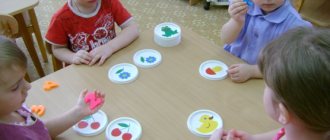Music Day, October 1 - Scenario of thematic leisure in the middle group “Music Day”
Publication “Scenario of thematic leisure in the middle group “Day...”
“Journey to a musical country” (thematic leisure for the middle group) Ved: We are starting an unusual concert, And not quite the usual one, Our concert is a journey To a beautiful country. A country where sounds flow, Where there is no place for boredom, Where everyone sings, plays, And the heart skips a beat! Well,…
Image library "MAAM-pictures"
Music Day for preschool children 5–7 years old Music Day for preschool children 5–7 years old Screen: splash screen (October 1 is World Music Day) The phonogram sounds (harp. Enter the Music Fairy Lyra Music Fairy: Hello, guys! I came today to visit you, because October 1 is World Music Day. We...
Photo report on World Music Day entitled “You can’t live in the world without music” for preschoolers of preschool educational institutions
World Music Day was held on October 1, 2022 at the MBDOU “Kindergarten No. 3 of a combined type” in the city of Pikalevo under the title “You can’t live in the world without music” for preschoolers. The festive musical event was prepared and conducted by music director Lyudmila...
Consultation for teachers “Fate, inspired by Music” for the International Music Day at MAAM
Lyudmila Rybakova Consultation for teachers “Fate, inspired by Music.” To the International Day of Music at MAAM. (The photos presented in the article were taken by me). The year 2020-2021 in Russia, as well as throughout the World, has been declared the Year of Beethoven and the Year of Germany in Russia. In the 18th century - not to be...
Music Day, October 1 – Photo report on the musical journey on International Music Day
Article “Photo report on a musical trip on International Day...”
Music is the language of the heart, because it makes you feel. Music can tell things that words cannot say. The more a child learns about music, the more he will understand its beautiful language, the wider his horizons will be. The main task of music is to awaken emotions in people...
Scenario for the “Day of Music” holiday for children of senior preschool age
Goal: Expand children's understanding of music. Objectives: • To introduce the sound of musical instruments. • Arouse interest in music. • Expand your knowledge of famous classical music performers. • Involve children in participating in activities. Event…
Scenario for the Day of Music “Oh, a magical land of music” SCRIPT FOR THE DAY OF MUSIC “Oh, music, a magical land!” (Children enter the hall to the song “Ode to Music” (“Music from the sky will fly in verses...” On the screen there is a beautiful 3D screensaver with a view of the musical kingdom. The presenters come out to a magical, fairy-tale melody) Presenter 1 ...Music embraces us...
Scenario for the holiday “Day of Music” Scenario for the holiday “Day of Music” Calm, beautiful music sounds Speech therapist: Hello, dear guys, I’m glad to see you all, Guys, today is the first of October And we have not gathered in vain. Do you hear a quiet, melodic ringing? (musical background sounds quietly) He announces the holiday, O...
Pages: …
Classical music in the education of preschool children
To love music, you must first listen to it... Love and study the great art of music. It will open up to you a whole world of high feelings, passions, thoughts. It will make you spiritually richer, purer, more perfect. Thanks to music, you will find new strengths in yourself, previously unknown to everyone. You will see life in new tones and colors.
D. D. Shostakovich
Music accompanies a person throughout his entire life. It forms his moral character, develops the culture of his behavior, activates mental development, and influences the process of physical improvement. The influence of music is great and varied: one piece is easy to understand, while another makes you think. A child, just like an adult, will listen with great pleasure and enthusiasm to music that brings pleasure, and not to music that requires special attention. Therefore, parents, educators and music directors face the enormous task of teaching a child to listen to the music that reveals high thoughts and feelings, which will make his inner world spiritually richer, deeper and more perfect.
The formation of the musical culture of preschool children is given great importance in modern pedagogical research. The development of the theory and practice of musical education of preschoolers in our country was significantly influenced by the views of leading teachers and psychologists of Russia V. M. Bekhterev, P. P. Blonsky, L. S. Vygotsky, P. F. Kapterev.
It has been proven that music affects a child at the earliest stages of his life, starting from the prenatal period. The music that the expectant mother listens to influences not only the child’s well-being and the formation of his psyche, but also subconsciously shapes his tastes and preferences.
When perceiving music, a person’s imagination actively works, various musical and non-musical associations arise. All components of musical-aesthetic consciousness: interest in music, its emotional experience, thinking, imagination - are closely interconnected.
By acquiring certain knowledge about music, as well as skills and abilities, children become familiar with the art of music. Of course, preschool age is the most favorable for individual creative manifestations in musical activity.
Since preschoolers have not yet fully formed ideas about human feelings that exist in real life, music that conveys all the diversity of a person’s inner world will help expand these ideas. In addition to the moral aspect, musical education is of great importance for the formation of aesthetic feelings in children. By acquiring an interest in musical culture, a child learns the standards of beauty and becomes familiar with the Beautiful.
Without a doubt, music has a direct impact on the development of a child’s mental abilities, because the formation of musical thinking contributes to overall intellectual development. The vocabulary is enriched with figurative words and expressions that characterize the moods and feelings conveyed in music. Music also has a beneficial effect on the emotional sphere, because emotional responsiveness to music is one of the most important musical abilities. This is also connected with the development of emotional responsiveness in life, with the cultivation of such personality qualities as kindness and empathy.
The success of children's musical development depends on the degree of development of the music teacher, on his competence, on the flexibility of his approach and teaching methods, as well as the forms of organizing musical activity used in working with children. Of course, one of the most important aspects of the formation of musical taste in children is the quality of the repertoire used, i.e. the content of musical education. It is important to use highly artistic music when working with children, and this is, first of all, classical and folk music.
Practice shows that young children perfectly perceive the ancient music of Bach, Handel and the diverse music of other composers. Children usually react to rhythmic music (moving, marching) with involuntary movements. Throughout the preschool period, the circle of familiar intonations expands and consolidates, preferences are revealed, and the beginnings of musical taste and musical culture as a whole are formed.
Many famous classical composers wrote music specifically for children. From the repertoire of children's classics, it is necessary to introduce children at an early and younger age to albums of piano pieces for children - P. Tchaikovsky, E. Grieg, S. Maikapar, etc. In addition to children's music, it is very important to listen with children to fragments of classical works from different eras - AND Bach, W. A. Mozart, P. Tchaikovsky, S. Rachmaninov, and other foreign and domestic classical composers, thereby instilling in children the standards of beauty.
To bring some variety into the daily life of a kindergarten, it is necessary to conduct thematic presentations and seminars. For example, talk about ancient music and let them listen to it performed by the musical instruments for which it was written (harpsichord, organ). For clarity, it is better to accompany the story by showing illustrations that give an idea of the life and customs of the people of the era in which the work was created, and of the art of those times. In a thematic lesson, you can compare music from different historical eras, for example, dance. A wide variety of dance music can be used: from ancient dances: “Bourre”, “Gavotte”, “Minuet”, to waltzes by F. Chopin, F. Schubert, ballet music by P. Tchaikovsky.
Unusual new musical experiences enrich children, leaving an indelible mark on the child’s upbringing, and contribute to the formation of interests, feelings, imagination, thinking, assessments, tastes, and value attitudes towards music. It is known that as a result of musical influence, the sensitivity of not only auditory but also visual analyzers increases, the mental processes of attention, perception, and memorization improve, metabolic processes are regulated and the level of anxiety decreases.
As the wonderful composer D. B. Kabalevsky said: “The main task of mass musical education of children is not so much teaching music in itself, but rather influencing the entire spiritual world of children, primarily their morality. It is very difficult to teach children art, and the main difficulty here is that it is impossible to truly teach children anything in art if you do not captivate them emotionally with this art.”




